Posts by Breakstone, White & Gluck
Swimming Pool Accidents Can Be Avoided By Owners’ Safety Steps
 With the warm weather and pool season upon us, we wanted to take a moment to discuss important pool safety precautions to prevent injuries and drowning.
With the warm weather and pool season upon us, we wanted to take a moment to discuss important pool safety precautions to prevent injuries and drowning.
A swimming pool holds many risks for injuries, from defective equipment to unsecured locks. The biggest hazard, of course, is drowning. Drowning is the leading cause of death for young children ages 1 to 4 in the U.S. and the fifth leading cause of unintentional injury death for people of all ages. In children under 15, non-fatal drowning is more common than drowning. Non-fatal drowning happens when the brain loses oxygen due to submersion. This can cause brain damage and long-term disabilities.
In many cases, drowning and other pool-side injuries can be prevented if everyone using your pool is closely monitored at all times and your equipment complies with safety guidelines. The Boston personal injury lawyers at Breakstone, White & Gluck share these tips for pool owners:
Fencing. Residential pools must be secured by a fence at least four-feet tall. More than half of all swimming pool drownings among young children could be prevented by four-sided fencing that separates the pool from the house and yard. The fence should have self-closing and self-latching gates that open outward.
If your house serves as a fourth side of a fence around a pool, install door alarms and always use them.
Pool Alarms. Install pool and gate alarms to alert you when children go near your pool.
Drain Entrapments. Keep children away from drains, pipes and other openings to avoid entrapments. Purchase drain covers that comply with the Virginia Graeme Baker Pool & Spa Safety Act. The federal law covers pools which are open to the public, apartment complexes and hotels, but you can purchase these covers for your residential pool. Ask your local pool supplier or visit PoolSafely.gov.
Diving Boards. Never install a diving board for an above-ground pool. If you install one on your in-ground pool, make sure the water is at least 10 to 12 feet deep. Diving is a leading cause of neck and spinal cord injuries. Check with your insurance agent or insurance broker to see if any special precautions are required under your homeowners insurance policy.
Pool Inspection. Call your pool dealer or local board of health and ask for the name of a pool safety inspector.
Telephone. Always keep a telephone outside near the pool in case of emergency.
Glass. Never allow glass in or near the pool. Broken glass is dangerous in the area around the pool, but even more dangerous in the pool itself where it can be completely invisible. We know from the cases that we have handled that broken glass in a pool can lead to serious personal injuries.
Watch Children Swim. Always make sure someone is watching children swim. Assign at least one adult to the task of watching the children.
Read More
Texting While Driving Case Highlights Dangers, Liability
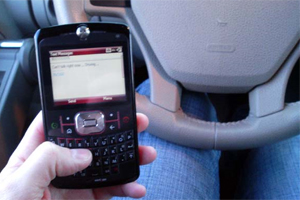 A Haverhill teenager was sentenced to jail time this week for causing a fatal accident by texting while driving, raising the issues of painful consequences, criminal punishments and civil liability families can face for what is becoming an all-too-common practice.
A Haverhill teenager was sentenced to jail time this week for causing a fatal accident by texting while driving, raising the issues of painful consequences, criminal punishments and civil liability families can face for what is becoming an all-too-common practice.
The case was the first of its kind in Massachusetts, where a ban on texting while driving took effect in 2010. As the 18-year-old driver was sentenced this week in Haverhill District Court, the public learned what criminal punishments violators can face. But the public should also be aware of what they did not see in the media: If a teen causes a car accident, they and their parents might also be sued civilly and may have to pay their victims significant financial damages.
In cases involving injury and death, a parent who negligently entrusts a car they own to a teen who they have cause to know is texting behind the wheel may be found liable for negligent entrustment. If so, then the parent might be sued and forced to pay damages to a victim.
Case of Texting While Driving
On February 20, 2011, Aaron Deveau, 18, was driving in Haverhill and crossed the center line, striking a car driven by a 56-year-old New Hampshire man. The man died of his injuries a few weeks later, while his passenger, a 59-year-old Haverhill woman, was severely injured and left with physical disabilities.
After the man’s death, Deveau was charged with motor vehicle homicide and texting and causing injury. The motor vehicle charge carried a maximum sentence of two and a half years in jail and the texting and causing injury was punishable by up to two years. A Haverhill District Court jury found him guilty of both charges and Judge Stephen Abana sentenced him to the maximum penalty. However, Deveau will serve a year concurrently on both charges and the balance of the charges is suspended for five years. His license will be suspended for 15 years on the motor vehicle homicide charge.
Prosecutors have been able to charge negligent drivers with texting and causing injury since September 30, 2010, when the Massachusetts law banning texting while driving took effect. The law banning use of electronic devices while driving is M.G.L. Chapter 90, Section 13B. If drivers cause injury or death, they can be criminally charged under M.G.L. Chapter 90, Section 24(2)(a).
The law applies to all electronic communications, including sending and reading texts, sending and reading emails, and any sort of internet browsing. For non-criminal charges (if there is no accident or injury), the fine is first $100, then $250, and then $500. Insurance surcharges do not apply to the civil penalties.
Read More
Motor Vehicle Accidents Increase When Teen Drivers Carry Teen Passengers, Study Reports
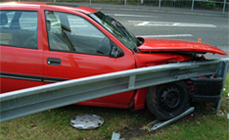 Among drivers, teenagers have long been known as the most likely to be involved in car accidents. But a new study released by AAA’s Foundation for Traffic Safety is now quantifying how much that risk increases when teen drivers travel with other teens.
Among drivers, teenagers have long been known as the most likely to be involved in car accidents. But a new study released by AAA’s Foundation for Traffic Safety is now quantifying how much that risk increases when teen drivers travel with other teens.
The study relies on federal fatality statistics and shows the risk for a fatal motor vehicle accident increases by almost half when a 16- or 17-year-old driver has one teen passenger in the car. The risk for a motor vehicular fatality doubles with two passengers and quadruples with three or more.
During the past decade, many states have implemented graduated licensing laws which have increased training requirements for new drivers, while also placing restrictions on passengers and hours of operation.
The Massachusetts’ junior operator license law prevents drivers from carrying passengers under the age of 18 during the first six months of having a license. There is an exception for siblings.
The law further bans teen drivers under 18 from operating between 12:30 a.m. and 5:00 a.m. unless accompanied by a parent or guardian.
In 2010, the state of Massachusetts strengthened junior operator restrictions when it banned the practice of texting while driving for all drivers. While most drivers face a fine for first-time offenses, teens face heavier penalties of fines, license suspensions and are required to attend retraining classes.
Drivers age 18 to 20 report the most phone use during motor vehicle accidents, according to the National Highway Traffic Safety Administration (NHTSA). The age group is three times more likely to report they are reading or sending a text message or e-mail during a car accident than drivers over age 25. Reports of texting while driving drops significantly as age increases, the NHTSA figures show.
We urge parents to strictly enforce junior operator laws in their homes. In addition to helping teenage drivers get experience without distraction, preventing use of a family car in violation of the junior operating laws is one way to avoid claims for negligent entrustment of an automobile.
Related:
Defective Bikes and Equipment List for Cyclists
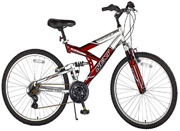 Each spring, cyclists throughout Massachusetts say goodbye to winter and put their bikes back on the road. But whether you cycle every day or just occasionally, now is the time to make sure your bike and equipment meets the latest safety regulations.
Each spring, cyclists throughout Massachusetts say goodbye to winter and put their bikes back on the road. But whether you cycle every day or just occasionally, now is the time to make sure your bike and equipment meets the latest safety regulations.
It is good practice to test and inspect key parts of your bike, such as the quick release wheels, brakes and pedals.Then check with the manufacturer of your bicycle. Look online and see if if offers an owners’ manual. If you have not done so, register your bike so you may receive recall notices.
You can also check the Consumer Product Safety Commission (CPSC) website for recent bicycle recalls. Each year, the CPSC recalls hundreds of thousands of bicycles and parts after receiving reports of defects and injuries.
Here are a few recent bicycle and equipment recalls from the CPSC:
Recalled Bicycles. Some 91,000 Bridgeway Bicycles were recalled in September 2011 because of a defective bicycle chain which can break, causing the rider to lose control and fall. The CPSC received 11 incident reports, including injuries, lacerations and contusions. Read more.
Children Bicycle Seats and Trailers. Two of the largest bicycle-related recalls involve defective children’s equipment. Topeak Babyseat II Bicycle Carrier Seats were recalled in April 2012 after two reports of near amputations and crushed fingers. When a child is lifted out of the seat, their fingers can get caught in a defective hinge mechanism. The product recall affected 30,400 consumers. Read more.
In January 2012, 44,000 Chariot bicycle trailers and 70,000 trailer conversion kits were recalled after 24 incident reports around the world, including three in the U.S. The trailer’s hitch mechanism can crack and break, causing the trailer to detach from the bicycle. Read more.
Helmets. Little Tricky Bicycle Helmets recalled 30,400 bicycle helmets in January 2012. Product testing demonstrated the helmets did not comply with CPSC safety standards for impact resistance. Read more.
Click for a full list of recent bicycle-related recalls from the CPSC.
Read More
Dog Bites and Dog Attacks Can Be Prevented
 With the return of the warm weather, many dogs are back outside with their owners in our neighborhoods, parks and yards.
With the return of the warm weather, many dogs are back outside with their owners in our neighborhoods, parks and yards.
This is the time of year dog bites often occur, as dogs encounter unfamiliar people and environments. Dog bite injuries can result when dogs are not properly trained, do not receive the right care and are not prepared for social interaction.
May 20 to May 26 is National Dog Bite Prevention Week, hosted by the American Veterinary Medical Association (AVMA). One of the organization’s messages is that dog bites and dog attacks are preventable if owners take the right steps to train their pets.
Children are the most frequent dog bite injury victims. Of 800,000 Americans who receive medical attention for dog bites each year, approximately half are children. In 50 percent of dog bite cases involving children, the dog responsible belongs to a neighbor.
Senior citizens are the second most common dog bite victims. On the job, more than 5,600 postal workers are attacked by dogs each year.
If you own a dog or plan to obtain one, you have a responsibility to practice safe ownership and protect others from dog bites and dog attacks. Our Boston dog bite lawyers offer you these safety tips:
- Make sure your dog is licensed and has received all of its vaccinations. These are your most basic responsibilities.
- Always use a leash when walking your dog. This is a courtesy to other people you encounter and helps protect everyone.
- Select your dog carefully and take time to research the breed. If it is a puppy, ask to meet the parent dogs. Never obtain a dog on impulse.
- Make sure your dog is always wearing its tags with appropriate identification information.
- Ask your veterinarian if they suggest a dog training school. If you choose to use one, do your research. Seek out references online and ask the dog school owner for client names.
- Train your dog to know basic commands such as “sit,” “stay,” and other actions. This builds a bond of trust between your dog and people
- Ask your veterinarian or dog trainer whether crate training may be appropriate
- Make sure your dog has opportunity for healthy interaction with other people and animals as a puppy. According to the AMVA, the first 6 to 14 weeks are critical to a puppy’s social development. The challenge is this is the time when a puppy is most vulnerable to illness so it is important to work with your veterinarian.
- Do not put your dog in a position where it feels threatened or teased.
- Make your home a safe environment for yourself, your dog, guests and neighbors. Consider fencing your yard. Make sure you have a door partition and a crate. Also make sure there are not any door or window openings which allow your dog to exit your home on its own.
- Your dog needs physical exercise and mental stimulation. Make time in your schedule to regularly walk and exercise your dog.
- Dogs can become bored and potentially destructive when left alone for many hours at a time. If yours is left alone all week, consider dog walking or daycare services for parts of the week.
- Avoid high-excitement games with your dog, such as wrestling.
- If your dog is showing signs of aggression, talk to your veterinarian and a dog trainer. If your dog bites or attacks someone, the injuries may be severe and long-term. You may also be held liable and have to pay damages.
SJC: Personal Injury Case May Proceed Against City of Newton
 The Massachusetts Supreme Judicial Court has rejected an appeal by the City of Newton which attempted to claim an exemption from liability for personal injuries suffered by a softball player on one of its fields. The City claimed it was exempt from liability under the Recreational Use Statute, but the court ruled the statute did not apply.
The Massachusetts Supreme Judicial Court has rejected an appeal by the City of Newton which attempted to claim an exemption from liability for personal injuries suffered by a softball player on one of its fields. The City claimed it was exempt from liability under the Recreational Use Statute, but the court ruled the statute did not apply.
The plaintiff in the case was a paying member of a softball league in Newton. While at a game one day in July, 2007, he was sitting in a grassy area, waiting for his turn at bat and watching the game. He heard a cracking sound, and turned to see a tree falling on him. He could not escape the falling tree, and suffered injuries to his back, shoulder blades, and other parts of his body.
The name of the case discussed is Marcus v. City of Newton, 462 Mass. 148 (2012), and was decided on May 7, 2012.
Click here to read our case summary and for a link to the opinion.
Read More
Motorcycle Accident Safety: Wearing The Right Helmet
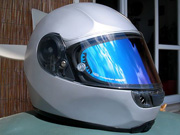 For motorcyclists, the most effective way to prevent a brain injury is to wear a helmet. An unhelmeted motorcyclist is 40 percent more likely to suffer a fatal head injury in a motorcycle crash than one wearing a helmet, according to the National Highway Traffic Safety Administration (NHTSA).
For motorcyclists, the most effective way to prevent a brain injury is to wear a helmet. An unhelmeted motorcyclist is 40 percent more likely to suffer a fatal head injury in a motorcycle crash than one wearing a helmet, according to the National Highway Traffic Safety Administration (NHTSA).
In Massachusetts and 19 other states, wearing a motorcycle helmet is the law for all riders. Twenty eight other states have laws requiring certain motorcyclists wear helmets. Three states, including New Hampshire, do not require motorcycle helmets for any riders.
Helmet use has grown in recent years as safety education has increased and manufacturers produce lighter-weight helmets. Helmet use increased from 48 percent of U.S. motorcyclists in 2005 to 67 percent in 2009, according to the NHTSA.
If you are a motorcyclist, it is important to protect yourself from motorcycle accidents as well as comply with the law. Our Boston motorcycle accident lawyers share some background information and tips for purchasing your motorcycle helmet:
Types of Helmets. Be sure to buy a helmet which is specifically designed for motorcycling. You may use different helmets for other activities, but these do not provide adequate protection in case of a motorcycle accident.
There are three types of helmets: full-face helmets; three-quarter, open-face helmets and “shorty” half helmets. A full-face helmet covers your entire face and provides the most protection. It has a moveable face shield which protects your eyes from debris and face in a motorcycle accident.
A three-quarter, open-face helmet has many of the same features, minus the face and chin protection of a full-face helmet. If you use an open-face helmet, it is recommended you also use a snap-on face shield or a pair of safety goggles when you ride.
The last type of helmet, a “shorty” half-helmet is not recommended by most safety organizations. It protects very little of your head and is the most likely to come off when you ride.
Safety Ratings. Since 1980, all adult-sized helmets for highway use have been required to meet the Department of Transportation (DOT) standards. Make sure your helmet has a DOT sticker before you purchase. The Snell Memorial Foundation is another safety testing laboratory for motorcycle helmets, though this rating is voluntary for helmet manufacturers.
Helmet Size. Most helmets are marked small, medium, large or extra large. Fit is important so measure your head at the largest circumference and contact your manufacturer to ask what size that measurement fits.
The goal is to avoid buying a helmet which is too large and can fall off. Here are a few things to note. The cheek pads should touch your cheeks without pressing uncomfortably. On full-face helmets, press on the chin piece. The helmet or face shield should not touch your nose or chin. There should be no gaps between your temples and brow pads. If the helmet has a neck roll, it should not push the helmet away from the back of your neck.
Replacing and Caring for Helmets. Follow the manufacturer’s instructions for caring for your helmet. It is best to use mild soap, water and a soft cloth. Avoid any petroleum-based cleaning fluid, which can cause the helmet to decompose over time.
Replace your helmet if the face shield is scratched as this will obstruct your view when riding. You should also replace your helmet if you’re involved in a motorcycle crash or if you notice any damage. Otherwise, many manufacturers recommend replacing your motorcycle helmet every two years.
Related:
- What You Should Know About Motorcycle Helmets, Motorcycle Safety Foundation
- Motorcycle and Bike Helmet Use Laws, Insurance Institute for Highway Safety
The Boston motorcycle accident lawyers at Breakstone, White & Gluck have over 80 years combined experience handling motorcycle accident cases in Massachusetts. If you have been injured, it is important to learn your rights. For a free legal consultation, contact us today at 800-379-1244 or 617-723-7676 or use our contact form.
Explosion Prevention for the BBQ and Grilling Season
 When the warm weather returns, many people look forward to grilling and choose propane gas grills. While these grills offer many advantages, propane is a highly combustible hydrocarbon gas which is compressed into a liquid form and placed inside a tank. It can explode in certain conditions, such as in a fire or with a tank leak.
When the warm weather returns, many people look forward to grilling and choose propane gas grills. While these grills offer many advantages, propane is a highly combustible hydrocarbon gas which is compressed into a liquid form and placed inside a tank. It can explode in certain conditions, such as in a fire or with a tank leak.
Some 6,500 barbecue grill fires injure Americans each year, accounting for a property loss of over $27 million, according to the U.S. Fire Administration, a division of Federal Emergency Management Agency (FEMA). The majority of these grill fires result from accidents and explosions related to malfunctioning gas grills.
Now as you set your grill up for the summer is the best time to learn how to properly clean and handle your propane gas tank and grill. The Boston personal injury lawyers at Breakstone, White & Gluck offer these tips to help you grill safely:
- Propane is an odorless gas with an odorant called ethanethiol added to help detect leaks. If you are near a propane tank and smell this gas, leave immediately and call your town’s fire department.
- Read the manufacturer’s instructions for your grill and if you need, contact customer support.
- Transport your propane tank to the refill station or hardware store in a standing position. Use a box or carrying case.
- Drive directly to and from the hardware store or refill facility. Do not make other stops.
- Store the propane gas tank outside your home with the grill and do not take it inside for any reason. This includes not taking it inside your garage or porch or leaving it on a deck attached to your home.
- Operate your propane gas grill and tank as far away from your home as possible.
- Most grills are now made with a safety device that prevents gas flow when the tank is disconnected. But always make sure your propane tank valve is closed when you disconnect to prevent fires and explosions.
- If you are having trouble heating your grill, do not keep raising the temperature. Check your manufacturer’s manual for instructions or call the company’s customer service phone number.
- Have propane gas equipment inspected periodically by a professional for possible leaks or malfunctioning parts. This will help prevent an explosion.
- Check your manufacturer’s manual for cleaning instructions. Turn the grill off and wait until it is cool. Lift the cover, inspect cooking surfaces and remove the cooking grids and spray with mild oven cleaner.
Related:
Propane Safety, National Fire Protection Association
What To Do After An Explosion
Read More
Bay State Bike Week Starts Monday; How to Participate as a Cyclist, Pedestrian or Driver
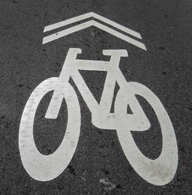 Bay State Bike Week starts Monday, May 14 and runs through Sunday, May 20. The annual celebration features several days of activities and educational programs throughout Massachusetts.
Bay State Bike Week starts Monday, May 14 and runs through Sunday, May 20. The annual celebration features several days of activities and educational programs throughout Massachusetts.
MassCommute Bicycle Challenge
Each year, one of the most anticipated events is the MassCommute Bicycle Challenge. For this one week, employees, students and others participate in teams to see who can pedal the most miles in the name of reducing traffic congestion, helping the environment and making time for fitness. Click the above link for information on how to participate.
Massachusetts Bike/Walk Summit on May 17
One event to watch this year is the Massachusetts Bike/Walk Summit on Thursday, May 17 at the State House. The event is co-sponsored by MassBike and WalkBoston, which seek to pass the Vulnerable Road Users Bill. If passed, the bill would increase fines for motorists who kill or injure vulnerable users. The term “Vulnerable Road Users” would include pedestrians, a person operating a bicycle, handcycle, tricycle, skateboard, roller skates, in-line skates or non-motorized scooter.
The bill was filed in January 2011 and is now in the Joint Committee on Transportation. MassBike has until June 1 to persuade legislators to advance the bill. The bill is supported by WalkBoston, Massachusetts Public Health Association, Conservation Law Foundation, Boston Cyclists Union, and Transportation for Massachusetts. Click the above link for information on how to participate.
Other Events
Bay State Bike Week will feature events and activities for all ages throughout the state, from Boston to Worcester to western Massachusetts. Most events are open to the public for free and are a great opportunity to learn more about cycling and the growing opportunities in Massachusetts. Click the above link for the full calendar.
Read More
Defective Pool Slide Kills Woman in Andover, Mass.
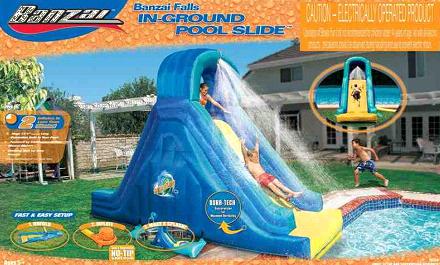 About 21,000 inflatable swimming pool slides are being recalled after the death of a 29-year-old woman in Massachusetts and two other people sustained serious personal injuries.
About 21,000 inflatable swimming pool slides are being recalled after the death of a 29-year-old woman in Massachusetts and two other people sustained serious personal injuries.
The Consumer Product Safety Commission (CPSC), Walmart of Bentonville, Ark. and Toys R Us Inc., of Wayne, NJ announced the recall Thursday, May 10. The Banzai inflatable water slides are designed for use with in-ground pools, but the CPSC says they pose a risk for injury. They can deflate and a user can hit the cement ground underneath the slide. The slide is also unsecure and can fall over, in both windy and still conditions. Finally, it carries inadequate warnings and instructions for users.
The CPSC is aware of one death and two serious personal injuries. In one case, a 29-year-old Colorado mother died in Andover, to the north of Boston. The woman died after going down a Banzai inflatable slide and hitting her head on the pavement below. The slide had been partially deflated.
The two injuries occurred in a similar manner, one leaving a 24-year-old man from Springfield, Mo. a quadriplegic. In a third case, an Allentown, Pa. woman fractured her neck.
The recalled pool slides were manufactured in China by Manley Toys, Ltd. and sold at Walmart and Toys R Us stores nationwide from January 2005 through June 2009. The defective product was sold for about $250. The vinyl slides have a blue base, yellow sliding mat and an arch going over the slide. The words ‘Banzai Splash’ are printed on the side of the defective slide.
The CPSC urges consumers to immediately stop using the defective product and return it to a Walmart or Toys R Us for a full refund. Consumers can also cut out the two safety warnings on the slide and return those for a refund. For additional information, visit www.walmart.com and www.toysrus.com.
Consumers can determine whether they have the slide by clicking here to look at pictures posted by the CPSC. If you still have the box and packaging, look for barcode number 2675315734 and model number 15734.
Read More

